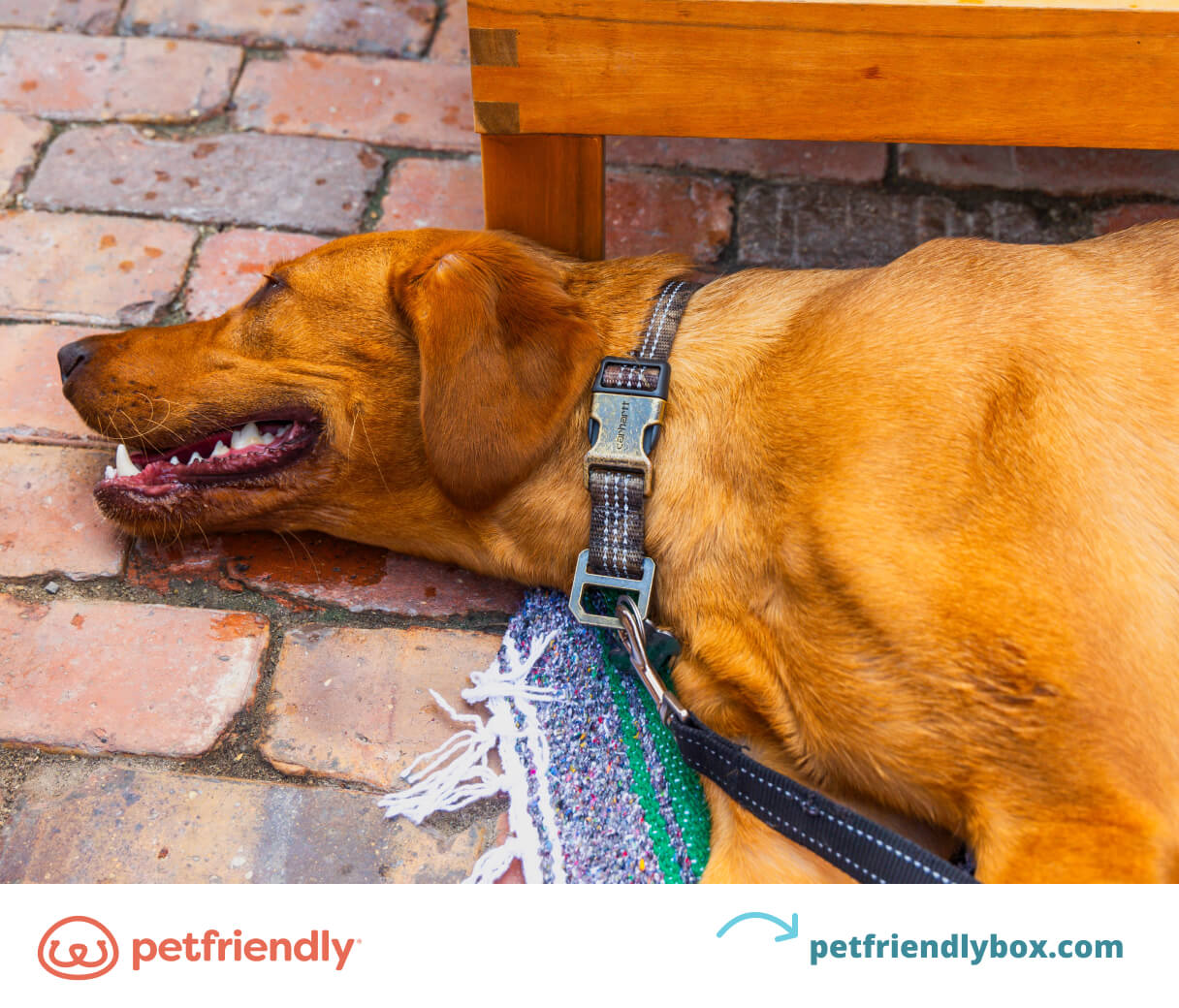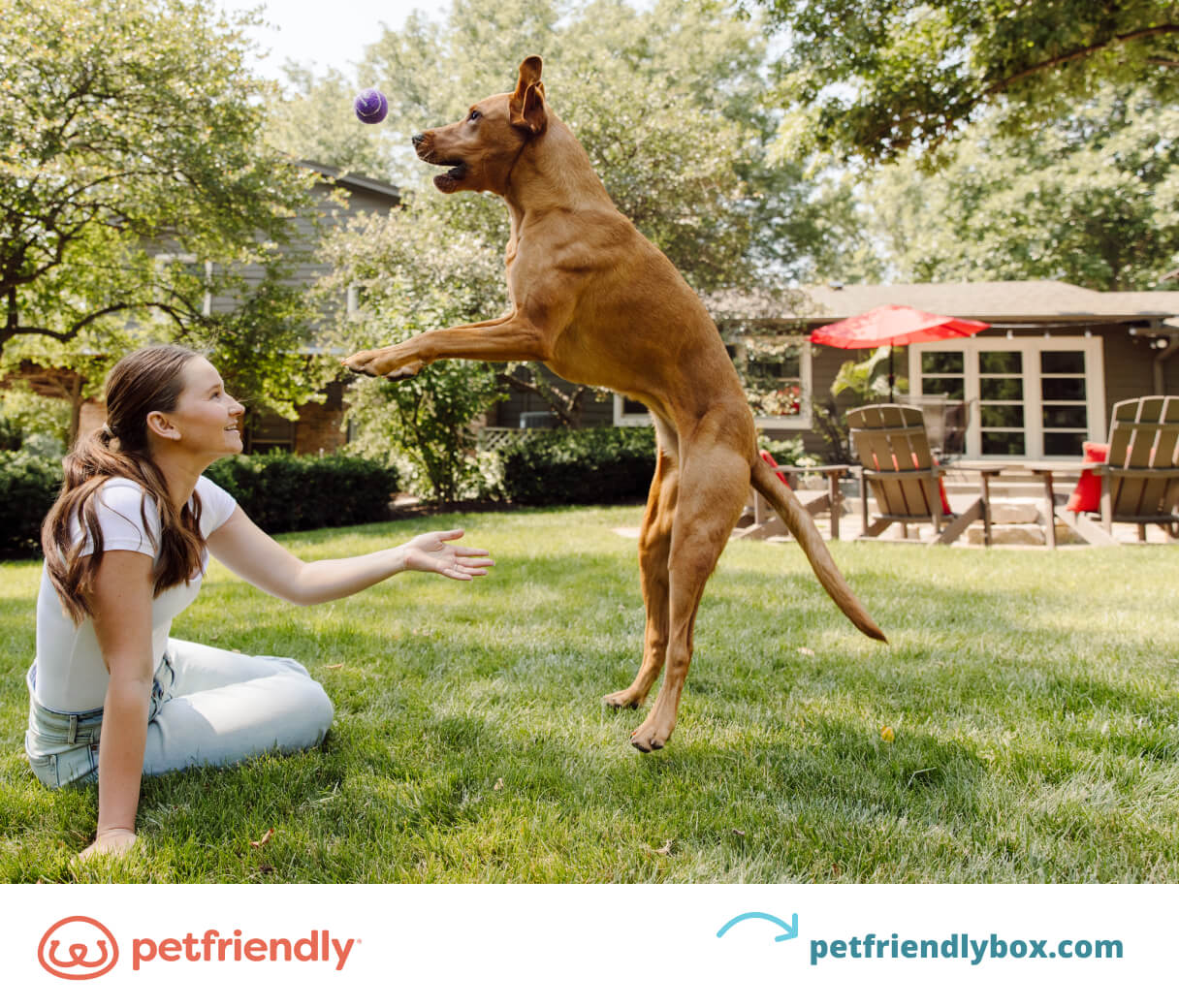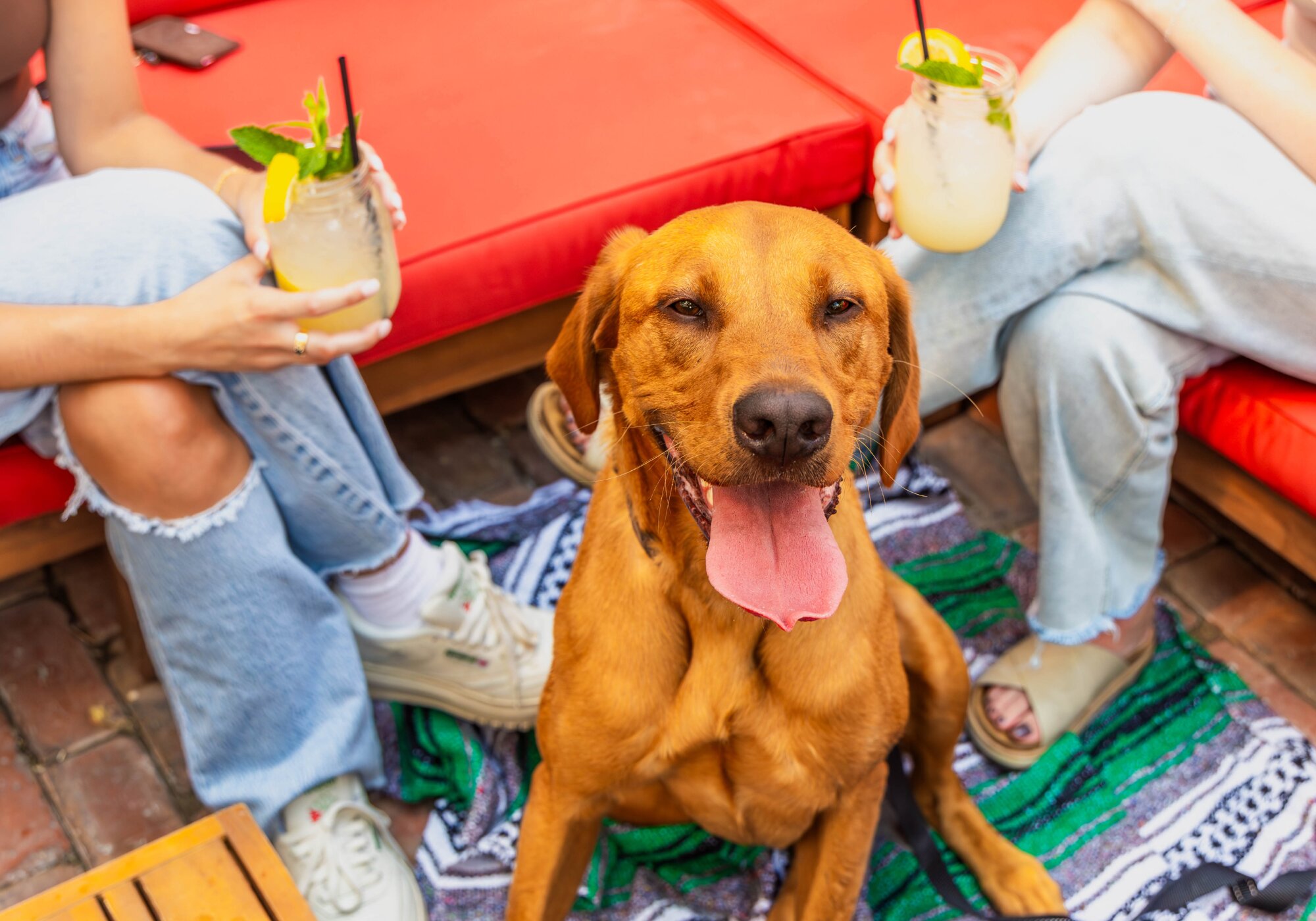The summer months are a great time to explore the outdoors or a dog-friendly patio with your pet. But, when the temperature heats up, the summer sun can be dangerous for your pet.
In this article, we’ll cover how dogs naturally stay cool in the summer. Plus, 12 hacks to help keep your dog cool in the heat and a delicious, frozen treat recipe for dogs.
How do dogs naturally stay cool

Have you ever realized halfway through your summer activity that your t-shirt is soaked? While this is good news for humans, dogs can’t sweat through their skin to keep them cool in the summer heat.
Dogs rely on their coats for temperature regulation. And, they release heat through sweat glands in their paw and nose. If your pet is not properly groomed, their coat will trap heat under your dog's fur.
Extreme heat can be dangerous and even life-threatening for your pup. That’s why it’s important to know how to keep your dog cool and comfortable in the warmer weather.
12 hacks to keep dogs cool in hot weather
Navigating extremely warm temperatures with your dog can be worrisome for pet owners. But, don’t worry — there are plenty of ways you can keep your furry friend safe and comfortable.
Here are 12 hacks to keep dogs cool in the summer heat.
1. Know the signs of heat stroke and dehydration in dogs.

Keeping dogs safe in the summer starts with knowing the signs and dangers of excessive heat. When your dog spends too much time in warm temperatures, their body temperature can rise to a dangerously high level.
If your dog’s body temperature stays high for too long, your dog may suffer from dehydration or heat stroke. If your dog is suffering from heat stroke, they may have symptoms like:
- Excessive panting
- Drooling
- Vomiting
- Diarrhea
- Loss of consciousness
If you think your pet is suffering from heat stroke, contact an emergency vet clinic immediately.
How to check your dog's body temperature
The best way to check your dog’s temperature is by using a digital thermometer. Pet parents can find thermometers at pet stores or online. Be sure to store your dog’s thermometer separately from human medical supplies.
But, you may find yourself on-the-go and not have the proper tools with you. In these cases, there are other ways to check their temperature.
Start by feeling your dog’s ears and paws. Your dog’s ears and paws have a lot of blood vessels. If your pet’s body temperature is high, these spots will likely feel hot to the touch.
2. Keep your dog at a healthy weight to avoid overheating.

Especially overweight dogs may suffer from overheating and exhaustion in mild heat. Dogs at a healthy weight may handle mild heat for longer periods. But, extreme temperatures put dogs of all sizes at risk of overheating.
To maintain your dog’s weight, be sure they are following a diet with the right vitamins and minerals they need. Plus, keep your dog active with regular exercise during the cooler parts of the day. Schedule a dog check-up with your vet if you have concerns about your pet’s weight.
3. Exercise and take walks during the coolest parts of the day.

Keeping your dog active with regular exercise is important for their overall health and wellness. But, walking your dog in direct sun on hot surfaces can be dangerous for your pet.
Instead of walking your dog over your lunch hour or in the afternoon, opt for an early morning or evening walk. That way, you can avoid hot weather and direct sunlight.
4. Save your dog's paws and skin with proper protection.

Direct sun on walking surfaces like asphalt and pavement can damage your dog's paws. Even artificial grass in direct sunlight can cause discomfort, blisters, and burns on your dog’s paw pads.
If you need to take your dog outdoors on sunny days, protect your dog’s paws with dog shoes or booties. And, be sure to moisturize your dog’s paws with a vet-approved lotion or paw wax.
DID YOU KNOW?
Dogs can get sunburns too! Hairless and short-haired breeds are more susceptible to sunburns than long-haired breeds.
Sun protection is important for these breeds, as just 30 minutes of sun can result in a burn. Sunburns in dogs can appear as hair loss or red skin.
Having a short-haired or hairless breed doesn't mean you can't participate in any outdoor activities. You can keep your dog's skin protected year-round with a dog sunscreen or a cooling vest while in direct sunlight.
5. Get your dog groomed more frequently.

Your dog’s coat helps regulate their body temperature. A healthy coat length will insulate (to keep them warm) or allow air to enter under looser hairs (to keep them cool), depending on the time of year.
While long-haired pups are more protected from the sun than short-haired breeds, excess hair can lead to overheating. If you have a long-haired dog, ask your groomer for a summer haircut. In warm weather, a shorter, brushed coat allows for proper airflow. This helps to cool your dog down on a hot day.
Double-coated dog breeds will shed some of their under-layer. But, brushing their coat regularly can help your dog’s cooling system work more efficiently. If you have a double-coated breed, visit a professional groomer to get the appropriate summer haircut for your dog.
6. Provide plenty of fresh water, but hydrate carefully.

Cool water is the most important factor in hydration. On especially hot days, you may wonder if putting ice water in your dog's water bowl will cool them down more effectively. But, giving your dog ice-cold water in large amounts can be dangerous.
If your dog is overheating or suffering from a heat stroke, do not give them ice cubes or ice water to cool down. The extremely cold temperature of the ice can shock their system and cause life-threatening conditions like seizures.
Instead, call your vet or take your pet in for an emergency check-up. In the meantime, cool them down gradually with cool water to drink. And, utilize a cooling station to keep your dog safe and comfortable.
7. Take frequent breaks when out and about.

If you are outdoors with your pet in warm temperatures, be sure to take plenty of breaks along the way. Frequent rest is important to ensure your dog does not overheat in the summer weather.
Even better, provide a shaded area to take breaks and cool down. Some examples include under a tree or umbrella. Dog houses with air conditioning are another great way to provide shade and get your pet out of direct sunlight.
8. Put together a cooling station for your dog.
A cooling station is a fun, interactive way to keep dogs cool in the hot weather. Consider including these items in your cooling station:
- Plenty of fresh, cool water
- A water bowl
- Kiddie pool
- Cooling mats
- Damp towel
Fill a kiddie pool with cool water for your pup to splash around in. You can also soak a cooling mat or a towel in cold water for your dog to lay on. These items will help your dog cool off while still enjoying the summer weather and sunshine.
9. Research hiking trails before you plan a hike.
Hiking with dogs is a popular activity for pet parents in the summer. If you take your dog out on the trail on a hot day, locate dog water stations along the way. And, bring fresh water with you for your dog to drink.
While the summer months are a popular time for hiking and outdoor activities, warm weather brings bugs and parasites that can impact your pet’s health. Make sure your dog is protected year-round with flea and tick prevention.
10. Never leave your dog unattended in a hot car.

If you do bring your dog along for a car ride, never leave your dog alone in a parked car during high temperatures. Even with the windows cracked, the inside of your car can become extremely hot and even toxic to your pet.
Keep your dog safe on hot days and leave them at home if you need to run an errand. If your dog loves car rides, take them for a drive in the early morning or evening to beat the heat.
11. Stay indoors during the hottest hours of the day.

Bringing your dog along for your midday grocery store run may sound like a fun idea. But, in the summertime, pet parents should leave their canine companions at home.
While you pick up last-minute ingredients for tonight’s dinner recipe, your dog can relax in the cool air conditioning at home.
12. Give them frozen treats and toys.

Just as humans enjoy ice cream cones and popsicles in the summer, your dog may enjoy something cold to chew on or lick too. Frozen toys and treats are an interactive way to keep dogs cool in the heat.
Frozen toys not only help keep dogs cool, but they also can soothe sore gums. If your dog is overweight, a frozen toy may be a better option than a frozen treat.
Not only do dogs love frozen treats, but they also can be a fun activity for pet parents to make. But, make sure you only use foods that are safe for your dog. If you aren't sure if an ingredient is safe for your dog, talk to your vet.
Here’s a frozen dog treat recipe that we love:
Frozen Pup Pops
Ingredients:
- 1 cup plain yogurt
- 1 banana
- 1 apple (chopped)
- ¼ cup coconut water
- ¼ cup peanut butter (substitute with almond butter)
Step 1: Get a silicone mold. You can find silicone molds in any shape, but we chose a dog paw mold for this fun frozen treat. The shape of the mold should be an appropriate serving size for your dog’s weight.
Step 2: Blend all ingredients together in a high-powered blender until smooth. This usually takes about a minute!
Step 3: After blending the mixture, spoon it into the molds.
Step 4: Place the molds in the freezer for two hours or until frozen.
Step 5: Treat! Be sure to limit your pet’s intake to just a few frozen treats per day. Too many frozen treats may upset your dog’s stomach.
Keeping dogs safe and cool in the summer may seem like a difficult task. But, having all the information and tools you need makes things simple. And, don't forget to keep yourself protected from the sun and heat, too!


